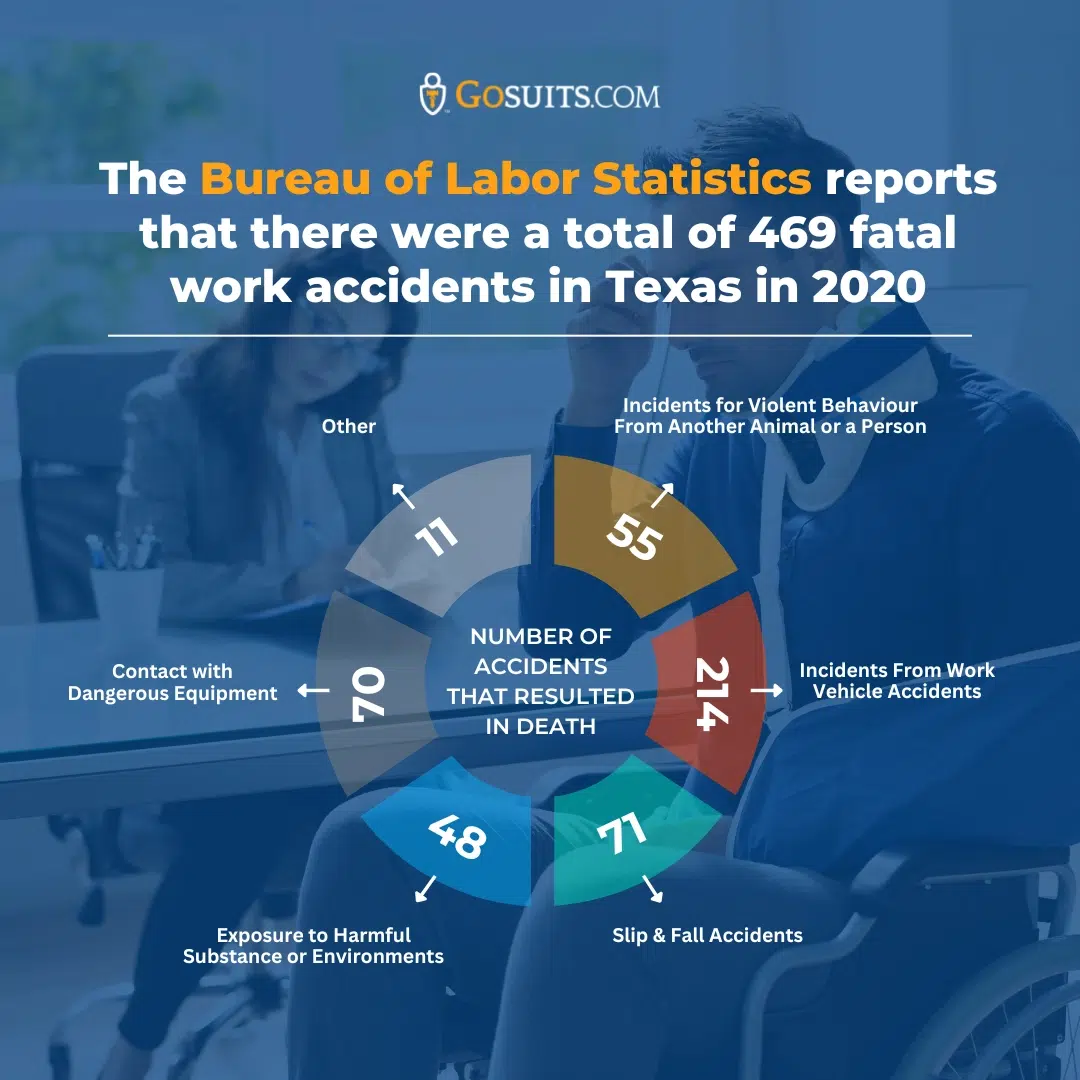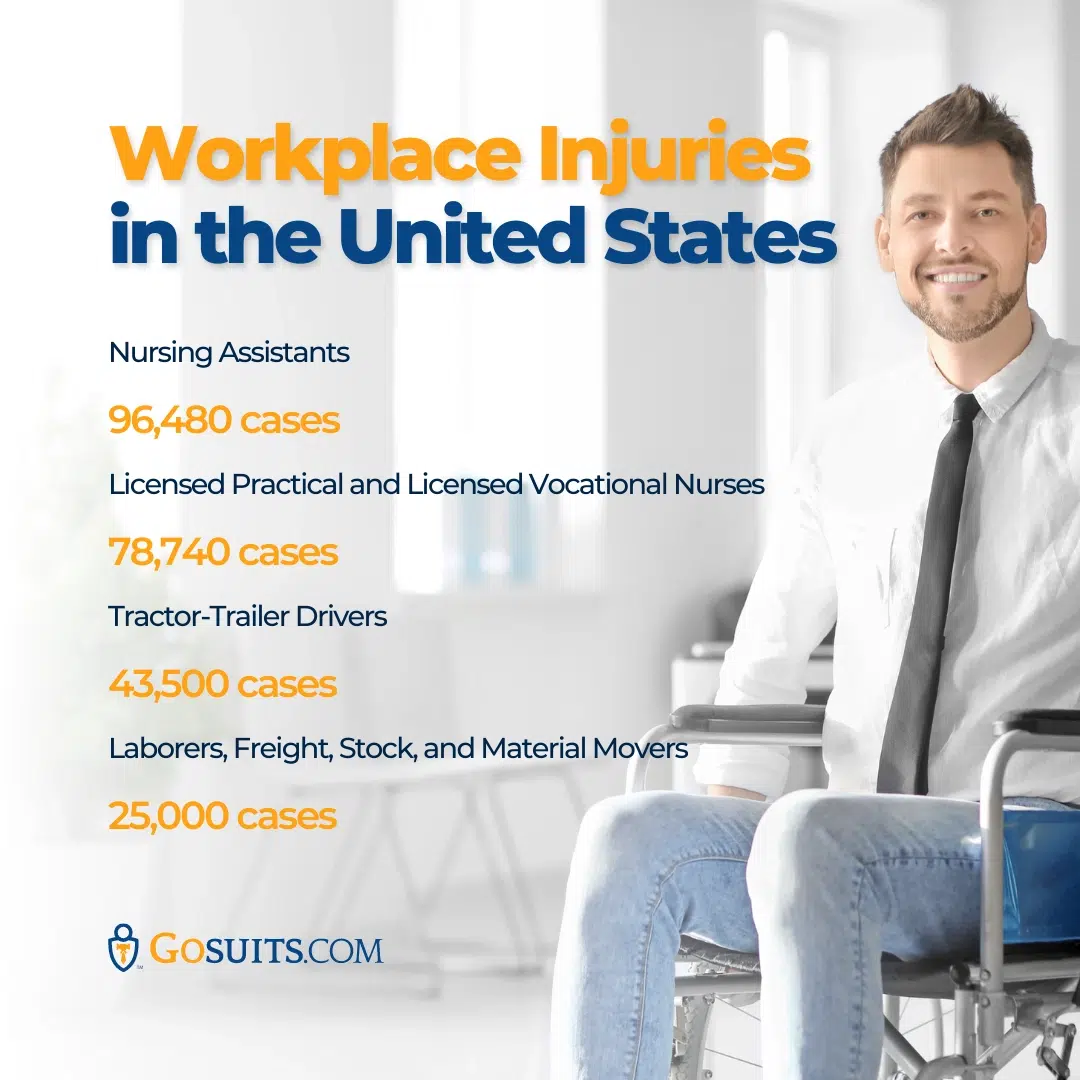Texas Non-Subscriber Workers’ Compensation Injury Lawyers
Work Accidents in Texas

According to the findings of the Bureau of Labor Statistics, there were a total of 469 fatal work accidents in the state of Texas in the year 2020. Accidents involving work vehicles made up the majority of these 469 accidents; they accounted for around 214 of them. The second most common type of incident was a slip and fall, which occurred 77 times. Other causes include coming into contact with dangerous equipment, suffering injuries as a result of the aggressive actions of other people or animals, being exposed to harmful substances or situations, and a host of other possibilities.
Workplace Injuries in the United States
In the year 2020, there were around 2.7 million nonfatal workplace injuries and illnesses reported across the United States. The healthcare industry and blue-collar industries were the ones that reported the highest number of incidents of non-fatal injuries that occurred at work. The following describe each of these:
- Nursing Assistants- 96,480 cases
- Licensed Practical and Licensed Vocational Nurses – 78,740 cases
- Tractor-Trailer Drivers- 43,500 cases
- Laborers, Freight, Stock, and Material Movers – 25,000 cases
Subscriber and Non-Subscriber Worker Compensation
If you have been hurt while working, you should be able to file a claim for compensation through the workers’ compensation insurance company that your employer subscribes to. However, not every business provides insurance for its employees. Companies who provide worker’s compensation to their employees are referred to as subscribers, whereas those that do not do so are referred to as non-subscribers.
Your ability to get compensation for your injuries will differ depending on whether or not the company you work for is a subscriber to the program. In order to help you develop a better understanding of how to acquire compensation following a work-related injury, this article will clarify the distinctions between a subscriber and a non-subscriber.
Subscribers to the Workers’ Compensation System
Texas is one of the states that does not mandate business owners to have workers’ compensation insurance for their employees. However, in accordance with the Workers Compensation Act of 1993, the state of Texas does offer financial incentives to firms who want to participate in worker’s compensation programs.
The Workers Compensation Act provides that employers who have worker’s compensation coverage are free from employee lawsuits, with the exception of situations in which the employer has shown an extreme level of negligence toward the employee. Employees have the right to launch a civil lawsuit against their employers in the event that the employer acted with gross negligence, in order to receive additional compensation to cover the cost of injuries and lost wages.
Subscribers to workers’ compensation offer their staff members an expedited approach to pursue financial compensation in the event of a work-related injury or illness. Simply said, employees can expedite the process of receiving their remuneration by completing the necessary documentation. After that, they are permitted to make use of their compensation to pay for any necessary medical bills and, in some instances, make up for any missed wages.
What Types of Costs Should Be Covered by Workers’ Compensation in Texas?
- Employers in the state of Texas who are subscribers to worker’s compensation are required to provide the following benefits to their employees, as stated by the State Division of Workers’ Compensation.
- Medical benefits include payment of medical expenses incurred as a result of a sickness or accident sustained on the job.
- Income benefits compensate an employee for a portion or all the money they lose as a result of an illness or injury sustained on the job.
- Workers in the state of Texas who suffer permanent bodily harm as a result of an on-the-job accident are eligible to receive impairment income payments.
- Workers who have experienced serious permanent damage and are unable to return to work or who are earning less than they were previously making as a result of their injuries are eligible to receive supplemental income benefits. These benefits are given out to workers.
- Workers who suffer certain catastrophic injuries, such as blindness or brain damage, are eligible to receive lifetime income compensation from their employers.
- Death and burial benefits are designed to compensate eligible family members for up to 75 percent of the deceased worker’s lost income in the event that the worker passed away on the job.
Compensation for Employees Non-Subscribers
The procedure of collecting compensation for an accident sustained on the job is made more difficult in the absence of worker’s compensation insurance. In the event that an employer is not a subscriber, it will be necessary for an employee to initiate legal action against their employer in order to get compensation for their injuries, either in full or in part. The validity of an employee’s claim will determine the amount of compensation they are eligible to receive. In some instances, the employer might attempt to reach a settlement outside of court. Before agreeing to any settlement, you should always discuss the matter with a personal injury lawyer who specializes in workplace accidents.
Why Do I Need a Lawyer for My Non-Subscribers Work Injury Case?
In a subscriber lawsuit, there is no need to prove fault but, in a non-subscriber case, you will need to show that your employer’s negligence caused your injuries. A lawyer who specializes in work accidents can help you collect the money you need to recover from injuries sustained on the job by demonstrating that your employer was negligent.
Never try to navigate the legal system on your own after suffering an injury on the job. It is wise to get help. GoSuits’ team of personal injury lawyers will assist you in gathering evidence and constructing a compelling case in order to obtain the financial compensation you are entitled to.
Practice Areas
Related Links
Sample Articles
- UNRAVELING THE PATH: AVERAGE SETTLEMENT FOR A CHILD IN A CAR ACCIDENT
- TEXAS WINDOW TINT LAW 2023 – A COMPREHENSIVE GUIDE
- WHAT SHOULD I DO IF I AM IN A CAR ACCIDENT WITH AN UBER OR LYFT?
- MULTIPLE PEOPLE INJURED AFTER DRIVER PLOWS THROUGH STARBUCKS IN COPPELL, TEXAS
- WHAT DOES “NO ATTORNEY FEE IF NO RECOVERY” MEAN?
- ARE THERE ANY ATTORNEY FEES HIDDEN?
- WHO WILL PAY FOR MY PROPERTY DAMAGE AFTER A CAR ACCIDENT?
- WHO WILL PAY FOR MY MEDICAL BILLS AFTER A CAR ACCIDENT?
